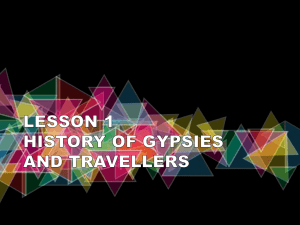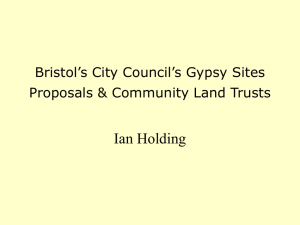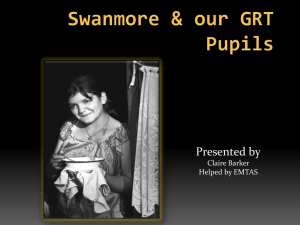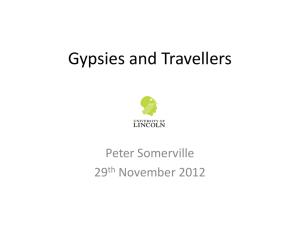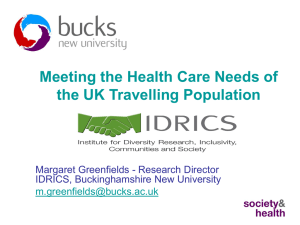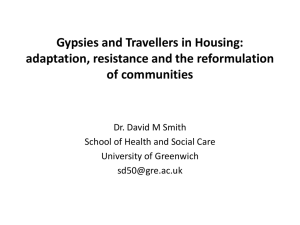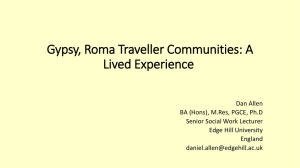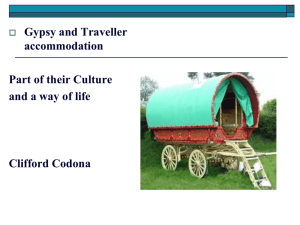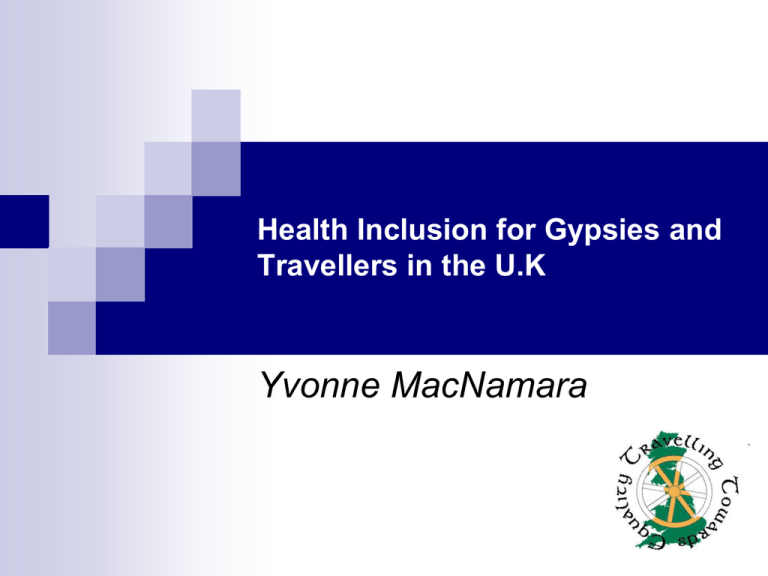
Health Inclusion for Gypsies and
Travellers in the U.K
Yvonne MacNamara
Brief Overview
Who are Gypsies and Travellers
Estimated population at 300,000 (Clements & Morris, 2002)
Recognised ethnic minority groups
Assimilation - three-quarters UK resident Gypsies and Traveller now live
in conventional housing(Commission for Racial Equality, (2004) )Gypsies
and Travellers: A strategy for the CRE, 2004-2007. London: CRE
Included in national Censes 2011
Largest populations Essex, Kent, Cambridgeshire, Surrey, and
Hertfordshire
Poor Health Outcomes
Ministerial Working Group on Tackling Inequalities Experienced by Gypsies and
Travellers, Progress Report, April 2012
39% of Gypsies and Travellers have a long-term illness compared with 29% of age and sex matched
comparators, even after controlling for socio-economic status and other marginalized groups
Travellers are 3 times more likely to have chronic cough or bronchitis, even after smoking is taken into
account
22% of Gypsies and Travellers reported having asthma and 34% reported chest pain compared to 5% and
22% of the general population
Gypsies and Travellers are nearly three times more likely to be anxious than average and just over twice
as likely to be depressed
Irish Travellers are 3 times as likely to die by suicide than the general population
There is an excess prevalence of miscarriages, stillbirths and neonatal deaths in Gypsy and Traveller
communities and high rates of maternal death during pregnancy and shortly after childbirth
A high prevalence of diabetes has been reported in Gypsy and Traveller communities, and a lack of
community knowledge of the risk factors
Studies show that Gypsy and Traveller women live 12 years less than women in the general population
and men 10 years less, although recent research suggests the life expectancy gap could be much higher.
To read full report go to:
http://www.communities.gov.uk/documents/planningandbuilding/pdf/2124046.pdf
EHRC, 2009, Inequalities experienced by Gypsies and Travellers
Poor quality or inappropriate accommodation, including as a result
of forced movement, inevitably exacerbates existing health
conditions as well as leading to new problems ( Patrice Van
Cleemput, 2008a).
Being forced to move on, results in a lack of continuity of care, the
treatment of symptoms rather than causes, the late detection of
abnormalities, and sometimes the misdiagnosis of maternal and
child health complications.
A recent study undertaken by ITMB of 44 Gypsy
Traveller Accommodation Assessments (GTAAs)
found that 26 (60%) made specific reference to the
impact of insecure accommodation on Gypsies and
Travellers health and access to health services with
18 (41%) of these citing primary data to support
their case.
Impact of Environmental Factors
Process of securing appropriate accommodation lengthy
and stressful
Site location –often located on waste ground-high risk
toxic waste and atmospheric pollution
Lack of LA sanitation services
The Barriers to inclusion
Literacy
Housing
Poverty
Formal education
Prejudice & Racism
Mobility
No standard ethnic monitoring
Gypsies and Travellers are not included in NHS’s16+1 national ethnic codes
despite being a ethnic category in the 2011 national census.
Nationally up to 85% of PCT’s do not conduct ethnic monitoring of Gypsies
and Travellers resulting in non-inclusion in JSNA’s, Health and Wellbeing
Strategies etc....
PCT's ethnic monitoring of Gypsies and Travellers:
Service use and Health & Wellbeing outcomes
Yes
No
16, 13%
89, 71%
Other
20, 16%
Inclusion and ethnic monitoring of Gypsies
and Travellers in the NHS: ITMB research
- Of the 125 responding PCTs, just 20 (16%) had
monitoring procedures in place (or were in the process of
introducing them) to assess Gypsies and Travellers
service use and health and wellbeing outcomes.
- The majority of respondents (71%, 89/125) conducted
no ethnic monitoring of Gypsies and Travellers and 16
(13%) said either the information was not held or gave
an inconclusive response categorized as other
Pre-eviction Dale Farm: Mary Ann McCarthy’s chalet
Post-eviction Dale Farm: Mary Ann McCarthy’s chalet
restored to the Green Belt
The importance of Joint Strategic
Needs Assessments (JSNA’s)
Health and Wellbeing Boards will conduct JSNA’s
Gypsy and Traveller inclusion in JSNA’s is crucial to ensuring
equality in health provision and improving outcomes
Research by ITMB indicates that just 14% of PCT’s make
reference to Gypsies and Travellers in their JSNA’s
Gypsy and Traveller reference in JSNA
Yes
No reference
17, 14%
108, 86%
Reluctance of GP’s to register
Gypsies and Travellers
Travellers are not always compliant with medication, this can result in GP’s
purposefully excluding them because it does not comply with target and
funding (e.g. there is 95% target for immunisation, including Gypsies and
Traveller can tip GP’s under 95% leading to cuts in their funding)
Moving Forward-Leavers for change
The Health and Social Care Bill 2012: New health inequalities duties of
this act come in to force April 2013!
The Health and Social Care bill 2012 contains specific
legal duties on health inequalities which comes in to force on 1st April 2013
Secretary of State
NHS Commissioning Board
Clinical Commissioning Groups
This is the first time that health legislation has outlined
specific legal duties on health
Duty for Secretary of State for Health
“In exercising functions in relation to the
health service, the Secretary of State must
have regard to the need to reduce inequalities
between the people of England with respect to
the benefits that they can obtain from the health
service”.
(Section 1C of the NHS Act 2006, as amended by the 2012 Act)
The phrase “health service” incorporates both
the NHS and public health. This duty will also
impact on Department of Health in terms of its
role to establish NHS and public health systems
Duty for Clinical Commissioning
Groups
Each clinical commissioning group must,
in the exercise of its functions, have regard
to the need to –
(a) reduce inequalities between patients with
respect to their ability to access health
services; and
(b) reduce inequalities between patients with
respect to the outcomes achieved for them by
the provision of health services.”
(Section 14T)
Moving Forward- Proactive Health Promotion and
partnership
Ethnic monitoring
DH Good Practice Guide “Statutory guidance on including Gypsies and Travellers in the Joint
Strategic Needs Assessments and joint health and wellbeing strategies”
Environmental and socio-economic factors –multi agency approach
Culturally appropriate Health Promotion Programmes (ITMB health advocacy training programme )
Adaptation of literature
Use of posters, DVDs (ITMB’s Mental Health DVD) leaflets and photo packs on a wide range of health
topics. Inclusion in JSNA is vital
What could a good JHWS look like for Gypsies
and Travellers
Representation of Gypsies and Travellers in the engagement process of the
Health and Wellbeing Board
Inclusion of the wider social determinants of health when developing
approaches to meet the health needs of Gypsies and Travellers
A clear communications strategy which enables Gypsies and Travellers to
understand the JHWS
Inclusion of existing community assets such as specialist organisations and
community experts, to meet the identified needs; build on existing
partnerships and opportunities. Consultation with these groups to be made
a statutory requirement in the drafting process
Meaningful Consultation with the community about what the priorities and
desired outcome of the JHWS should be
Multi agency and cross county partnership
Examples of inclusive and representative
JSNAs:
Cambridge JSNA
East Sussex Comprehensive Needs Assessment for Black and
Minority Ethnic Groups (Including Gypsies and Travellers) in East
Sussex
http://www.eastsussexjsna.org.uk/JsnaSiteAspx/media/jsnamedia/documents/comprehensiveneedsassessment/1-BMECNA.pdf
Surrey JSNA chapter: Gypsy, Roma and Travellers
http://www.cambridgeshirejsna.org.uk/travellers/travellers
http://www.surreyi.gov.uk/ViewPage1.aspx?C=resource&ResourceID=712&cookieCheck=true&J
Script=1
West Sussex – health and social care needs
http://www.westsussex.nhs.uk/?location_id=471
Bedfordshire NHS and Ormiston Trust, 2010, Health Needs Assessment of
the Gypsy and Traveller Community in Bedfordshire (excluding Luton)
http://www.bedfordshire.nhs.uk/downloads/hna_g_and_t_2010.pdf
Cumbria NHS, 2009, Health Needs Assessment: Gypsies and Travellers
of gypsies and travellers
Capacity building: ITMB Health &
Wellbeing Advocacy Course
ITMB Community Health & Wellbeing Advocates
Capacity building: ITMB & Royal
Free Maternity Course
“Of all the forms
of inequality,
injustice in health
care is the
most shocking
and inhumane”
Martin Luther King Jr
Convention of the Medical Committee for Human Rights held in
Chicago in March 1966
The Irish Travellers Movement
The Resource Centre
356 Holloway Road
London N7 6PA
Tel: 020 76072002
info@irishtraveller.org.uk
www.irishtraveller.org.uk

